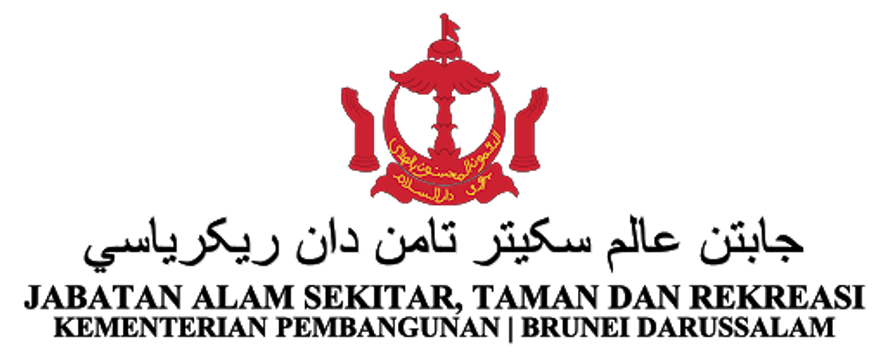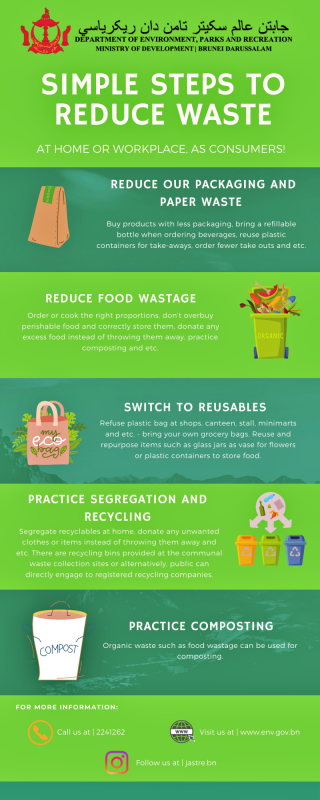
Waste Management in Brunei Darussalam
In 2019 over 297,218 metric tonnes (MT) of waste was generated in Brunei Darussalam and of that amount, only 11.3% was recycled. The remaining waste mainly ends up being disposed at our Engineered Landfills emitting about 0.23 MT CO2e of methane gas to the atmosphere every year, accounting to about 2.2% of Brunei's total greenhouse gas emissions in 2018.
As it stands, an average person in Brunei Darussalam generates about 1.14kg of municipal solid waste per person per day based on 2019 data, making Brunei Darussalam among the highest waste generator per capita in the ASEAN region. As the economic and population growth continue to increase, waste management is increasingly getting complex as our landfill capacity runs out.
How is our waste managed?
Brunei Darussalam's waste management, for both general and hazardous waste, is under the purview of the Department of Environment, Parks and Recreation (JASTRe), Ministry of Development and is governed by legislations, policies and guidelines set forth by JASTRe. The operational activity of waste management involves the collection and disposal of wastes generated from the residential, commercial, industrial and institutional sectors.
Collection of waste includes private collection or door-to-door collection, is done by registered waste collectors that are listed under JASTRe. The public also has the option of utilizing the waste collection centres provided by the Government across the country. The daily waste collection at these centres are carried out and managed by contractors appointed by the Department.
While the nation is strongly encouraged to practice 3Rs – Reduce, Reuse and Recycle to deal with their waste, most of the remaining waste which comprises of the non-recyclables and non-reusables are still disposed of at the Sungai Paku Engineered Landfill - the country's main landfill which currently accommodates more than 90% of the total waste. The landfill together with the Sungai Akar Transfer station, which acts as a drop-off point for waste generated from the Brunei-Muara District, are managed by JASTRe through term contracts.
The top 4 composition of wastes we should know
There are many different types of waste generated in Brunei from across the different sectors bringing with them unique challenges in how they are collected, handled and disposed of. From domestic waste to agricultural waste, commercial and industrial waste, more often than not, these wastes are mostly disposed rather than recycled.
Municipal solid waste which includes waste from domestic, agricultural and commercial sector, has become a major concern over the past years as the amount of waste generated has increased tremendously. The top four composition of municipal solid waste disposed at the Sungai Paku Engineered landfill is mainly made up of food waste which accounts for 32% of the total waste disposed, followed by plastic waste, green waste and paper which accounts for 29%, 11% and 10% respectively.
Of the 297,218 MT generated in 2019, a total of 245,400 MT of waste was disposed at Brunei's main landfill located at Kampong Sungai Paku in Mukim Telisai, Tutong District. Spanning over 104 hectares of land, the Sungai Paku Engineered landfill receives waste at a daily rate of 672 MT per day. These wastes are sent here and are then buried within four excavated areas known as landfill cells. It is estimated that the landfill cells will reach its full capacity by 2030. However, with the increasing trend of waste growth, this target is expected to come sooner rather than later.
Furthermore, the decomposition process leads to the build-up of methane gas which is a greenhouse gas that is 28 times more potent than that of carbon dioxide which contributes to climate change. At the current rate of waste generation, Brunei Darussalam's greenhouse gas emission from the waste sector is projected to increase to 0.30 MT CO2e by 2035.
The recycling rate fell from 27.6% in 2018 to 11.3% in 2019. Except for used tyres, all recyclables collected by recycling companies are exported for recycling due to inadequate recycling infrastructure and facilities.
What actions are being taken by the Government?
With the grwing concerns and threats from the increasing waste generation, the government has taken pro-active measures to address our waste challenges such as ensuring a sustainable and efficient waste management system is in place.
Recognizing the gaps in recycling infrastructure and ecosystem, the government is also currently looking to develop the recycling industry and achieve a significant increase in the recycling rate by adopting policies, setting up institutional mechanisms and multi-stakeholder partnership.
Waste management is a cross-sectoral issue whereby close collaboration and coordination between government agencies and other relevant stakeholders (private sectors and NGOs) as well as public support and participation is required in order to collectively and holistically address waste issues.
Notably, numerous initiatives and programmes have been implemented collaboratively with the primary goal to minimize waste generation in particular with the implementation of 3R initiatives, namely Reduce, Reuse and Recycle.
The government has set out key targets to achieve waste generation per capita to 1kg per person per day and a recycling rate of 30% by 2035. To achieve this target, the government has identified key strategies namely: 1) waste minimization, 2) cost effective, efficient and sustainable collection, 3) adoption of waste-to-resource technologies, 4) youth empowerment and 5) enforcement enhancement.
How can we do our part?
Although numerous initiatives and activities have been implemented and provided by the government, there is still room for improvement for Brunei Darussalam to achieve a sustainable and efficient waste management system. However, each individual and organization has to play a role for a cleaner and greener Brunei.
As consumers in general, we all directly contribute to the waste generation in Brunei. As a start, we can start practicing the 3Rs at home where most of our waste is being generated. The public has access to recycling bins provided by the government at the waste collection centres and information on recycling collection activities.
Below are just some of the easiest way we, as a consumer, can reduce our waste generation at home or workplace:

Small changes and small steps can bring along massive impacts to our lives and surroundings. Whether we chose to reduce our waste or actively recycle our items from our daily activities, each step is certainly one step further to saving our environment.
Prepared by:
Department of Environment, Parks and Recreation
Ministry of Development
Date Published: February 2021


